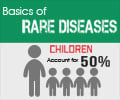Among children born with the chromosome disorders trisomy 13 or 18 surgical intervention increased their survival rate by 1 year than their counterparts.

‘Trisomy 13 and 18 are genetic diagnoses associated with characteristic physical features and organ anomalies, often including cardiac malformations and neurologic impairments that occur in approximately 8 to 15 per 100,000 live births.’





Katherine E. Nelson, M.D., of the Hospital for Sick Children, Toronto, and colleagues examined survival and utilization of any type of surgery among children born in Ontario between April 1991 and March 2012 with a diagnosis code for trisomy 13 or 18 on a hospital record in the first year of life. All procedures classified as occurring in an operating room were categorized as major, intermediate, or minor surgeries. The study included 174 children with trisomy 13 and 254 children with trisomy 18. Median survival times were 12.5 days for trisomy 13 and 9 days for trisomy 18. Average 1-year survival for trisomy 13 was 20 percent and 13 percent for trisomy 18. Ten-year survival for trisomy 13 was 13 percent and 10 percent for trisomy 18.
Survival did not change over the study period. Forty-one children (24 percent) with trisomy 13 and 35 children (14 percent) with trisomy 18 underwent surgeries. Median age at first surgery for trisomy 13 was 92 days and for trisomy 18 it was 206 days. Analysis indicated 1-year survival after first surgery of 71 percent for trisomy 13 and 69 percent for trisomy 18.
The authors note that longer-term survival and use of surgical interventions were more common in this study than previously reported in population-based studies.
Source-Newswise












